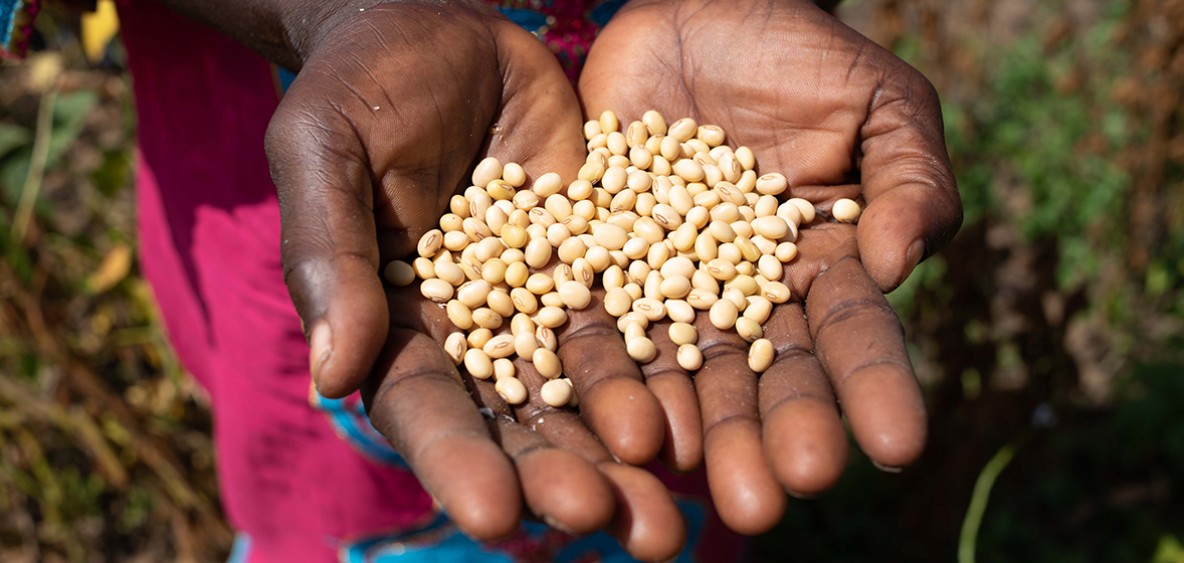
The three awardees of the UNDP-AGRA catalyst grant have been announced: Kilimo Trust and Musoma Foods Pvt Ltd in Tanzania and Uganda; the GRAD Consulting Group in Burkina Faso and Niger; and the African Institute of Corporate Citizenship in Malawi and neighbouring countries.
The economies of the RFS countries are mostly dominated by small-scale, rain-fed subsistence agriculture. Land degradation is common and is leading to a decline in agricultural production and a loss of agrobiodiversity. This, coupled with very limited access to agricultural inputs and competitive markets, is contributing to food shortages and food insecurity, malnutrition, poverty, and increased vulnerability to climate change.
For RFS projects, adopting an agri-food value chain greening approach is vital, and means designing and implementing interventions that address constraints and challenges that exist within specific links of an agricultural production system - from input suppliers to end markets.
In 2019, in support of this objective, two Regional Hub partners - the Alliance for a Green Revolution in Africa (AGRA) and the United Nations Development Programme (UNDP) - hosted a training workshop on greening agricultural food value chains for RFS country project teams. The purpose of the training inception event was to gauge country projects’ understanding of the value chain greening concept; build capacity in the application of value chain concepts to farming operations; raise technical awareness of how to make food value chains more sustainable and resilient; and identify the training needs within country-specific value chains.
The workshop laid a foundation for continued interactions at country-level on resilient and sustainable value chain development and related follow up training sessions. These interactions will intensify as country project teams begin to implement their value chain ‘greening’ action plans and will require further support and consultation with technical partners.
Building on this, in April 2020, AGRA and UNDP launched a call for expressions of interest, inviting applications for sub-regional catalytic grants to be awarded to organisations working to strengthen agri-food value chains and integrate natural resource management into African food systems. AGRA and UNDP requested proposals addressing key resilience, sustainability, production and marketing constraints affecting selected regional staple food crops and livestock.
63 value chain greening concept notes were received from interested organisations across the 12 RFS countries, nine (9) of which were shortlisted and further developed into full project proposals.
In
November 2020, after receiving the short-listed applicants’ project proposals,
AGRA and UNDP selected three grant winners:
1. Kilimo Trust and Musoma Foods Pvt Ltd were awarded a USD 200,000 grant to promote sorghum value chains in the Lake Zone farming region by strengthening market linkages and promoting regional trade structures between Tanzania and Uganda.
The project aims to directly support the transformation of 25,000 smallholder-farming households, 40 percent of those households will be woman-led, contributing to the programme’s goal of mainstreaming gender considerations throughout programme activities.
The project will benefit an additional 30,000 farming households indirectly through transformation of market, trading, financial, inputs and knowledge sharing models.
2. The
GRAD Consulting Group was awarded
a USD 200,000 grant to develop rice value chains in Burkina Faso and Niger by
scaling up sustainable productivity-enhancing technologies, improving
post-harvest and storage technologies, and supporting agro-processing business
units and farmers groups.
The project aims to increase yields by at least 30 percent and rice sales by at
least 50 percent of the current sales volumes and transactions.
As with all RFS projects, knowledge sharing to allow for
replication and scale up is important. This project aims to produce at least
five knowledge products on green agribusiness development and farming
technologies in the rice value chain, including case studies and knowledge
exchange visits between Burkina Faso and other West African RFS countries.
3. The African Institute of Corporate Citizenship (AICC) was awarded a USD 200,000 grant to scale up climate-smart agricultural technologies in groundnut value chains, restore and protect soil health, and connect women and young groundnut farmers with markets in Malawi and neighbouring countries.
The grant will support 3,000 women and 2,000 young farmers in adopting climate-smart agricultural technologies, including the use of certified seeds, inoculants, Aflasafe (to reduce aflatoxin), double row and integrated pest management practices; as well as labour-saving agricultural inputs and services. These farmers will be connected to profitable local and regional groundnut markets and will improve their business management, banking and financial knowledge.
The
first tranches of grant funding are in the process of being disbursed. Further
updates will be provided on project progress as the awardees begin their work to
upgrade sustainable value chain systems and, as a result, establish more
sustainable livelihoods and reduce food insecurity within the targeted RFS
countries.
Subscribe to our monthly newsletter to receive updates on stories directly from the field across all our projects, upcoming events, new resources, and more.